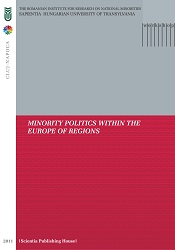Language Policies in Central and East European States with Hungarian Minorities: Implications for Linguistic Rights Protection of National Minorities in the EU
Language Policies in Central and East European States with Hungarian Minorities: Implications for Linguistic Rights Protection of National Minorities in the EU
Author(s): László Marácz
Subject(s): Politics / Political Sciences, Language studies, Language and Literature Studies, Law, Constitution, Jurisprudence
Published by: Scientia Kiadó
Keywords: peace-treaties; multilingual states; Hungarian minorities; exclusive and inclusive language policies; Europeanisation; Council of Europe
Summary/Abstract: Due to the peace-treaties of the twentieth century, Hungarian minorities live in seven different Central and East European states, including Slovakia (520,000), Ukraine (200,000), Romania (1,930,000), Serbia (400,000), Croatia (30,000), Slovenia (20,000), and Austria (5,000). In agreement with Central and East European tradition, the most important feature of ethnic identity is the mother tongue. Hence, these states are de facto multilingual states, although not all of them consider themselves de jure as such, but rather as monolingual nation-states. In the latter cases, Hungarian minorities are confronted with a ‘policy of exclusion’, that is discriminating language laws restricting the use of the Hungarian language in the official and public space. This leads to polarised, divided societies along the lines of ethno-linguistic cleavages. This paper compares exclusive and inclusive language policies in multilingual Central and Eastern European states with Hungarian minorities. We will investigate the legal system in these countries concerning the status and use of the languages of national minorities. It will be concluded that the position of the Hungarian language in the countries concerned can be classified into two groups: (1) Serbia, Slovenia, Croatia, and Austria; (2) Slovakia, Romania, and Ukraine. In the first group, the minority language has a legal status equal to the language of the majority and is included into the official domains. This is especially true for Serbia’s Vojvodina region where an official policy supporting multilingual, multicultural society is pursued. In the second group, minority languages are subordinated to the official state language, they are restricted in the official domains, and additional requirements and conditions determine their use. Hence, the second case does not match the EU’s democratic standards whereas the first case respects these standards. This grouping is interesting as all the countries involved are subject to the process of Europeanisation. All seven countries mentioned above are members of the Council of Europe (CoE), they have ratified the Framework Convention for the Protection of National Minorities and the European Charter for Regional or Minority Languages, and foremost, four countries, Austria, Slovenia, Romania, and Slovakia are members of the Union. Two of these countries, Romania and Slovakia are however not in the group where democratic values and standards are satisfactory. Hence it follows that the membership of the Union is not a guarantee for the protection of the linguistic rights of national minorities. Thus, we can observe a discrepancy between the theory of the Union celebrating linguistic diversity and democratic values and the practice in the Member States. It turns out that there are no effective controlling and sanctioning mechanisms in the Union available when the linguistic rights of national minorities are violated and multilingual practice is banned from the public and official space. The state of affairs in the second group is not only violating human rights but it undermines the cohesion of the Union and affects the deepening of conflicts between the states with Hungarian minorities and the kin-state of Hungary (see Brubaker et. al. 2006, Csergő 2007). This implies that we have to reconsider the controlling and sanctioning mechanisms in the legal framework of the Union. An important step forward would be the adoption of the Council of Europe’s Framework Convention and the Language Charter as a benchmarking system by the Union, as well as the integration of these into the Union legal system. This would allow sanctions against states violating them.
Book: MINORITY POLITICS WITHIN THE EUROPE OF REGIONS
- Page Range: 155-183
- Page Count: 29
- Publication Year: 2011
- Language: English
- Content File-PDF

